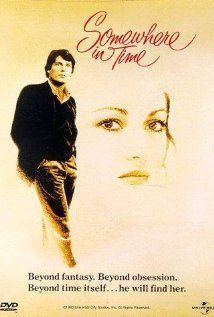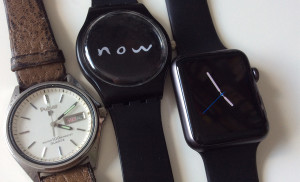For some reason, 2015 is replete with time travel tales from the continuing Doctor Who through multiple movies and new TV shows. This could be good: I am obsessed with time, it’s something somehow personal to me, and I’m excited enough by all these that I want to talk to you about them.
Unfortunately, every one of these new tales is about time travel and that’s not actually what interests me. I’m really more into things like regret – you can’t go back in time to undo things – and it’s also a kind of practical obsession. I produce a lot of events now and your mind splits when you do that, it splits into planning out the time of the event itself with what must happen when, and it also has you working out what time you’ve got left to prepare it.
But.
I do have a fondness for time travel stories because alongside the TARDIS or the DeLorean, their stories at least touch on these time issues that so occupy me. Going back in time and seeing something from a new perspective, cor. Going forward in time and seeing the consequences of your actions, fantastic.
As a writer, time is a tool to examine characters and to truly test them. I think it is a woefully underused dramatic device. Mind you, it is also a bleedin’ complicated dramatic device and so prone to leaving you unsure what’s happening that even I haven’t pulled it off well yet.
I am trying. So I will watch all of 2015’s spate of time travel movies and TV. Unfortunately, I’m not looking forward to it. Not to all of it.
There are some good ones. I’ve seen the pilot to 12 Monkeys, the TV version of the film, and that is good enough that I’m definitely coming back for the series. (In the UK, it’s begun airing this week on SyFy.)
Similarly, I’ve seen the pilot to Outlander and it’s a bugger that this series will only air on Amazon Prime instead of proper telly. It’s a rather beautiful series that looks gorgeous and has a compelling tale of a 20th century woman in battle in the 17th century. Lots of utterly wonderful scenery in Scotland, also rather a lot of voiceover narration.
I haven’t seen Hot Tub Time Machine 2 which opens in UK cinemas in April. Reviews of it are so bad – and so convincingly bad – that I may have lied to you just now, I may not see all of these time stories. It’ll be on the telly some day, I’ll maybe catch it then. I did enjoy the first one, mind. If you don’t know that one or its sequel, the short summary is that they both feature a hot tub, they both feature time travel, but apparently only the first film has any jokes.
I should be nipping out today to catch Project Almanac as that’s finally in UK cinemas right now after a long delay. A year ago, I’d have gone for sure. I was intrigued by the first trailer that began circulating before the movie was pushed back twelve months. A group of teenagers discover a time travel machine and abuse it terribly – until they find that something they’ve done has gigantic consequences for the world. Usual stuff, really.
But there is a second trailer now that is so perfunctory that it feels like they knew they had to do something. Yeah, yeah, that bit looks good, use that, slap on the title, we’re done.
It also has poor reviews. I’m an ex-reviewer and my own work gets reviewed sometimes now, I should know that you don’t put too much weight on a reviewer’s opinion. Yes, when you find a reviewer who seems to share your tastes, that’s one thing. But a single bad review is unlikely to put me off anything, if I’m sufficiently interested in it.
Like Hot Tub, though, Project Almanac is getting chiefly poor reviews from everyone. I have to go see it now, don’t I?
Next, there’s a movie called Predestination that officially has opened in cinemas this week but you try finding it. It was made last year and it’s done the festival circuit, it’s had screenings all over, I’ve eventually come to accept that I’ll need to watch it on iTunes or DVD when that release happens in April.
Predestination is said to be better than Project Almanac, there is precious little doubt that it is better than Hot Tub Time Machine 2.
But.
It’s based on Robert Heinlein’s famous time short story, “– All You Zombies –” from 1960. Fancy reading it? You can right here. It has nothing to do with zombies as we’d expect today, no walking dead, grrr, arg stuff. Instead, it is a classic of time stories.
However.
I don’t want to spoil both Heinlein’s story and Predestination in the same breath – I like to space out my spoilings – so I can’t explain why I doubt the film is great and I am sure it won’t become a mainstream hit. Let me try anyway. Heinlein’s story is incredibly clever and it bashes through the kind of human drama that only time travel’s ability to show you the same events from different views can do. It’s just that it felt to me like a brilliant puzzle instead of a story.
Remember, I don’t care how someone travels in time, I’m interested in what this ultimate change in perspective does to them. So I’ll even ignore the odd plot hole if I care about the characters and Heinlein’s story is air-tight about plot, I’m just not especially interested in the characters.
Maybe it’s a clue that I’ve spent all this time discussing the plot and haven’t told you the story. If you see any new time travel movie this year, see Predestination, but be warned it looks iffy.
So there’s Predestination which is iffy, there’s Project Almanac which is iffy-plus, there’s Hot Tub Time Machine 2 which is grade-A iffyness incarnate. There’s Outlander which is beautiful and languid and absorbing and I want to see more but I’d appreciate it if they cut down on the amount of narration. There’s 12 Monkeys which I watched just to see how they could turn the movie into a series and they seem to have done it remarkably well so far.
There’s also a US series called The Flash which apparently features time travel. But I hadn’t even heard of The Flash until this character was mentioned on The Big Bang Theory. I’ve been told all sorts of complicated things about this guy and the versions of him in comic books, in this series and in apparently forthcoming movies, but deep within all of it was that the series is boring. It gets better, I’m insistently told, but.
Maybe I think too much about this stuff. Maybe if I were less into the issue of time, I’d better enjoy these movies that dabble in it instead of feeling they waste a potent situation.
But this is 2015 and while I don’t know why we’ve suddenly got all of these, I do know that the year was already special for time. For 2015 is both the thirtieth anniversary of Back to the Future and it is the year featured in its sequel as the far future.
Do a google search on this movie and you’ll see many articles now about how it got the future wrong. That astonishes me: time travel stories are never about the future or the past, no matter when they’re set. Back to the Future is so firmly about the 1980s and what it was like for people living then. The 2015 of Back to the Future Part II is not a prediction, it is a new perspective on how people thought and what they expected.
Plus hoverboards.
Look, I’m into this stuff – time, not hoverboards – and I’m telling you about all these things coming up because I’m interested in them and I want to share but the more I write, the more down I sound on them all.
Okay. If you see one new time travel movie this year, make it Predestination. But this is 2015, we can watch just about anything we want, whenever we want it. So have a deep dive into the very richest, very best of time movies.
There’s Looper, that’s rather good. Primer is superb and Timecrimes is brilliant. The film 12 Monkeys. Back to the Future is the easiest watch but no less good for that.
On TV right now there’s 12 Monkeys the series – it’s very different, you can watch both series and film without one spoiling the other. Doctor Who of course, though actually it is rarely about time. The episode Blink is and I defy you to not choke up at the line “It’s the same rain”.
Is that it? Or do I just feel I’ve taken up enough of your time?
Listen, one more thing. Just between us. I did call this Self Distract entry “It’s about time” because it’s about time. But Angela and I have a watch that dates back to when we finally got together, years upon years after we’d been friends and I’d been trying hard. It’s a lovely little pocket watch that hangs in a small bell jar and engraved on the back are the words “It’s about time”.
Told you it was personal.

